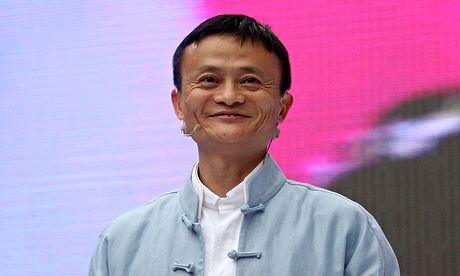
Last March, Jack Ma rose to a podium in front of a crowd of international investors, who met him with thunderous applause. "E-commerce in the USA is like a dessert," he said in fluent English, his cadence calm and measured. "But in China ... e-commerce is the main course – the only way to shop."
Ma will find out soon how much value investors are prepared to put on his version of e-commerce. His Alibaba Group, a "business-to-business marketplace for global trade", is preparing to list on the New York stock exchange any day now in what is expected to be one of the largest stock market debuts in history. The Chinese company could be worth $100bn (£59bn).
But China's eighth-richest man does not wear his $10bn fortune on his sleeve. The stick-thin, five-foot-tall 49 year-old has a bulging forehead and expressive hands which dart about to underscore his bolder points. Yet Ma is possibly one of contemporary China's greatest success stories.
Chinese media call Alibaba an "empire," though Ma prefers the term "ecosystem". Between its two retail sites: Taobao (like a Chinese eBay) and TMall (closer to Amazon), Alibaba controls 80% of China's e-commerce market and accounts for more than half of its parcel deliveries. The company's Alipay (like a Chinese Paypal) boasts more than 800 million registered users.
Last year, Ma stepped down as the company's chief executive to devote more time to making China's "water clearer, skies bluer, and food more secure". He has lobbied against the consumption of shark's fin. This month, he launched a campaign to crowd-source a map of the country's water quality.
"My father said if you were born 30 years ago, you'd probably be in a prison, because the ideas you have are so dangerous" he told the American TV interviewer Charlie Rose in 2011. Both men laughed at the irony.
In interviews, Ma's billionaire persona seems to blend naturally with his English-teaching pedigree. He speaks in a heady mix of aphorisms and metaphors. "Because of [China's] rapid economic growth in the past 30 years, and the lack of religious beliefs in this country, our management follows a less consistent pattern [than the US]," he told Washington University business professor Xiao-Ping Chen last year. "We must take scraps from here and there, and nothing is our own." His own style, he said, combines precepts from Taoism, Buddhism, Confucianism, and Tai Chi. During the interview, he likened management to fish in a pond and gold bars falling from the sky.
"In China, just when the internet was getting started, there weren't many outlets for young people to express themselves. They couldn't do that in politics or even the arts, really," said Porter Erisman, a former Alibaba vice-president and director of Crocodile in the Yangtze, an upcoming documentary about his experience with the company. "So the internet is where the first homegrown heroes of this new generation came from."
Ma declined to be interviewed for this article; Alibaba's communications team said that the company is "effectively in a quiet period."Ma lives in Hangzhou, a historical eastern city of 8.7 million people known for its scenic lakes and its fresh, mild cuisine. He was born two years before the start of the Cultural Revolution; his parents were performers of Ping Tan, a traditional form of theatre. As a student, Ma performed poorly in maths, but excelled in English; he would take foreigners around the city's main tourist attractions to practise. Ma failed his college entrance examination twice, but did well enough on his third try to enrol in Hangzhou Normal University, where he studied English. He graduated in 1988, and taught English for years at a local university, making $12 per month.
In 1995, Ma discovered the internet during a short trip to the US. His first internet venture, the listings website Chinapages, failed. In 1999, he started Alibaba with 17 friends in his Hangzhou apartment. At the time, e-commerce was unheard of in China. "I called myself a blind man riding on the back of blind tigers," he once said in a speech.
Although Ma enjoys an amicable relationship with the Chinese government – authorities appreciate his economic pull – his international profile has occasionally put him in awkward situations. In the early 2000s, Yahoo caused controversy by handing over information on a journalist and a pro-democracy campaigner to the government, which jailed the two for subversion. In 2005, Ma planted his company firmly on the side of the authorities: "We create value for the shareholders and the shareholders don't want us to oppose the government and go bankrupt," he said. "Whatever [government officials] say, we'll do it."
Yet Ma has a penchant for pushing at boundaries and has turned down numerous opportunities to form joint ventures with state-owned firms. According to a profile of Ma in the Financial Times, he has often told employees to "be in love with the government but never marry it".
"The frontier areas that Alibaba can move into are exciting, but they all face some government hurdles – like financial services, or telecommunications, or media," said Erisman. "These are all areas that are inefficient because they're state run." Alibaba's newest venture is in online finance, a sector which is dominated by the state. Last summer, the People's Daily quoted Ma as calling Chinese financial regulations "excessive". On 12 March, Alibaba announced plans to launch a virtual credit card, allowing users to invest and buy insurance. Ma also knows that in China the political winds can change in a heartbeat. Two days after Alibaba announced plans to offer the card, China's central bank blocked the company's plans.
"Sometimes, what can beat you is not technology but just a document," Ma said at a technology forum last month. He did not elaborate.

